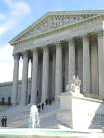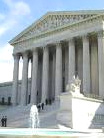|
|
|
Supreme Court rejects Ebbers fair-trial
Court Watch |
2007/03/06 09:40
|
| The U.S. Supreme Court on Monday rejected an appeal by the ex-WorldCom Inc. chief of his federal fraud and conspiracy conviction in the $11 billion accounting scandal that destroyed his former Clinton-based company and cost investors thousands of dollars. A former P.E. coach-turned-telecommunications king, Ebbers had challenged two facets of his federal trial that resulted in a 25-year prison sentence. The justices rejected without comment Ebbers' bid for review of his 2005 conviction based on his contention that he was denied a fair trial. Hearing the news, Thomas Harris of Brandon, a former WorldCom accountant, who at one time thought he might be able to retire at age 40, said, "I don't harbor any ill feelings against Bernie, but when we make decisions we have to live by them." Harris, a 13-year employee, left the company, then known as MCI, to open a business with his wife when it appeared he would have to move to stay with the company. "Hopefully all of this will be a deterrent to other executives making decisions not good for a company," Harris said. Ebbers began serving his sentence in the Federal Correctional Institution in Oakdale, La., in September, and the Federal Bureau of Prisons Web site lists July 4, 2028, as the 65-year-old Ebbers' projected release date. Absent a presidential pardon -which was less likely than Supreme Court intervention - Ebbers will serve his sentence, said Matt Steffey, a professor at Mississippi College School of Law. Steffey said he wasn't surprised the Supreme Court rejected Ebbers' appeal. "Other than Mr. Ebbers' status as a businessman, there was nothing noteworthy from a legal perspective," he said. "It seems he got a fair trial, he was ably represented and he had his conviction reviewed by the Court of Appeals. Everything went according to form. "Cases like this rarely get reviewed by the Supreme Court. If Mr. Ebbers weren't famous, there would be little public interest." Ebbers argued in court papers the trial judge improperly allowed prosecutors to use testimony from witnesses who had been given immunity but denied immunity to potential defense witnesses. The judge also instructed jurors they could find Ebbers guilty if they believed he suspected a crime was being committed but intentionally looked the other way. A federal appeals court upheld the conviction last year while acknowledging Ebbers' sentence for a white-collar crime was longer than sentences routinely imposed by many states for violent crimes. The 2nd U.S. Circuit Court of Appeals said Ebbers' actions to hide WorldCom's financial problems were substantial and had cost investors dearly. Stacey Wall, president and chief executive officer at Pinnacle Trust Wealth Management in Ridgeland, said he sympathizes with investors who lost money but thinks Ebbers' sentence was too harsh. "Relative to other corporate scandals and executives involved, he got very unfair treatment," he said. Ebbers was convicted of fraud and conspiracy in March 2005 for his role in the scheme that drove the former telecommunications giant into bankruptcy in 2002. Investigators uncovered $11 billion in fraud, much of it because accountants were classifying regular expenses as long-term capital expenditures. The company re-emerged under the name MCI and moved the headquarters to Virginia. Verizon later bought MCI. |
|
|
|
|
|
|
Supreme Court rules in Colorado redistricting
Law Center |
2007/03/06 09:29
|
The US Supreme Court handed down decisions in two cases Monday, including Lance v. Coffman, where the Court concluded that four Republican voters in Colorado did not have standing to challenge a court-ordered congressional redistricting plan. A state judge in Colorado drew up a redistricting plan in 2002 when the state legislature was unable to agree on a plan in time for elections that year. The legislature drew up a plan in 2003, but that plan was rejected by the Colorado Supreme Court because the state constitution allows for a new plan only once per decade. The state supreme court held that "judicially-created districts are just as binding and permanent as districts created by the General Assembly." The redistricting plan was subsequently challenged by four voters, who argued that their rights had been violated under the Elections Clause of the US Constitution, which states that the "Manner of holding Elections for Senators and Representatives, shall be prescribed in each State by the Legislature thereof; but the Congress may at any time by Law make or alter such Regulations, except as to the Places of choosing Senators." The US Supreme Court ruled that the plaintiffs did not have standing, writing:
The only injury plaintiffs allege is that the law - specifically the Elections Clause - has not been followed. This injury is precisely the kind of undifferentiated, generalized grievance about the conduct of government that we have refused to countenance in the past. It is quite different from the sorts of injuries alleged by plaintiffs in voting rights cases where we have found standing. Because plaintiffs assert no particularized stake in the litigation, we hold that they lack standing to bring their Elections Clause claim. |
|
|
|
|
|
|
Libby Found Guilty in CIA Leak Case
Breaking Legal News |
2007/03/06 09:27
|
The jury presiding over the perjury trial of former vice-presidential aide I. Lewis "Scooter" Libby returned a guilty verdict Tuesday after 10 days of deliberation in the case that began January 23. Libby faced perjury and obstruction of justice charges in connection with the investigation into the leak of the identity of former CIA operative Valerie Plame. He was found guilty on four of five counts. US District Judge Reggie B. Walton dismissed a juror last week after finding she had been exposed to information about the CIA leak case over the previous weekend. Deliberations continued with just 11 jurors, despite the availability of two alternate jurors. Earlier this week, Walton refused to answer a jury question on the level of proof that would have to be met to find Libby guilty. The jury wanted to know whether in order to satisfy the requirement of proof beyond a reasonable doubt they had to find it would not be "humanly" possible" for Libby to completely forget conversations which witnesses had testified took place. Walton determined the question was too vague to be properly answered. Libby's defense team rested February 15, one week after the prosecution finished presenting its evidence against Libby. Lawyers subsequently made their closing arguments February 20 in which the defense argued that Libby was a scapegoat for presidential aide Karl Rove's disclosures, while the prosecution argued in its final remarks that Libby was merely trying to a cover up a potentially illegal intelligence leak. |
|
|
|
|
|
|
New Jersey verdict for Vioxx drugmaker upheld
Court Watch |
2007/03/06 09:27
|
A New Jersey superior court judge Monday upheld a Friday jury verdict for Merck & Co, finding that the company had given adequate warning to physicians of the risks associated with its painkiller Vioxx. Judge Carol Higbee rejected a motion by plaintiffs attorney Mark Lanier disputing a finding that the drug company had warned doctors prescribing Vioxx that a 2004 study showed the drug doubled the risk of heart attack or stroke in patients who took it for longer than 18 months; Lanier represents the estate of a deceased man whose fatal heart attack is alleged to have been caused by the drug. Merck faces more than 27,000 lawsuits from people who say they were harmed by the once $2.5 billion-a-year drug before it was pulled from the market in September of 2004. Merck has set aside $1 billion to fight every Vioxx court challenge. In November 2006, a federal judge declined to certify a national class action suit, ruling that it made more sense to try the cases in their respective states of origin. |
|
|
|
|
|
|
Ruling favors Merck in next Vioxx trial phase
Biotech |
2007/03/05 15:44
|
Merck & Co. won't have to defend against claims that the painkiller Vioxx caused a Wisconsin man's fatal heart attack during the second phase of a trial that begins today. Judge Carol Higbee in Atlantic City on Monday rebuffed a request by Brian Hermans' family to let jurors consider whether Vioxx caused the accountant's death. The jury ruled on Friday that Hermans had been adequately warned of the drug's risks.
The jury also found that Merck, the third-largest U.S. drugmaker, didn't properly warn another man, Frederick Humeston. Humeston's attorney will present evidence in the trial's second phase that Vioxx caused his client's September 2001 heart attack. Merck faces 27,000 lawsuits over Vioxx, which was pulled from the market in 2004. "We're pleased with the judge's decision," said Kent Jarrell, a Merck spokesman. "We are preparing for the second phase of the trial, where we believe the evidence will show Vioxx did not cause Mr. Humeston's heart attack." Merck, based in Whitehouse Station, has won eight verdicts and lost four on the question of whether Vioxx caused patients' heart attacks. In the latest Atlantic City trial, jurors found that Merck warned Hermans of the risk by changing Vioxx's label in 2002. The panel also concluded in both the Hermans and Humeston cases that Merck misrepresented the risks in marketing Vioxx, and that its handling of the drug violated New Jersey consumer laws, entitling the families to triple reimbursement for their expenses for Vioxx, plus payment of legal fees. |
|
|
|
|
|
|
Court denies GOP redistricting challenge
Court Watch |
2007/03/05 09:02
|
| The Supreme Court on Monday ruled against Colorado Republicans challenging a congressional redistricting plan favorable to Democrats. In a unanimous decision, the justices said that the four Republicans were not entitled to sue in an effort to replace a redistricting plan ordered by a court with one passed by a Republican-controlled state legislature. A Democratic state judge drew up the first redistricting plan in 2002, while the Republican Legislature drew one up in 2003. The court plan had been put in place when a divided Colorado General Assembly was unable to agree on one in time for the 2002 election. In their lawsuit, the Republican voters say the court-imposed map violates a right of citizens under the U.S. Constitution to vote for congressional candidates in districts created by state legislatures. In an unsigned opinion, the justices said that the only injury the Republican voters allege is that the Elections Clause had not been followed. "This injury is precisely the kind of undifferentiated, generalized grievance about the conduct of government that we have refused to countenance in the past," the court stated. Citing earlier rulings, the justices said the Republicans must have more than a general interest common to all members of the public in order to pursue the case. Last year, a U.S. District Court in Colorado had ruled that the Republicans could proceed with their lawsuit asserting an Elections Clause violation. The Colorado case is the Supreme Court's latest foray into congressional redistricting battles. Last year, the justices addressed a messy redistricting fight in Texas, ruling that the Constitution does not bar states from redrawing political lines in mid-decade when one party or the other senses an advantage. The decision grew out of a court review of a Texas redistricting plan orchestrated in 2003 by Tom DeLay, who was a Republican congressional leader at the time. The Colorado dispute also involved a lawsuit brought by the Democratic state attorney general. It led to a Colorado Supreme Court decision against the Republican legislative plan in 2003. The Colorado Supreme Court said the state constitution restricts congressional redistricting to once per decade and that the legislature's plan was the second plan. |
|
|
|
|
|
|
Lawmakers look beyond Walter Reed fix
Breaking Legal News |
2007/03/05 09:01
|
| Substandard living conditions found at the Army's flagship veterans hospital likely exist throughout the military health care system, the head of a House panel investigating Walter Reed Army Medical Center said Monday. "We need a sustained focus here, and much more needs to be done," Rep. John Tierney said of a scandal enveloping Walter Reed. Charges of bureaucratic delays and poor treatment there have produced calls in Congress for quick reform. Tierney said he is afraid "these problems go well beyond the walls of Walter Reed," adding that "as we send more and more troops into Iraq and Afghanistan, these problems are only going to get worse, not better." The hearing brought an apology from the Army's top civilian. "We have let some soldiers down," said Peter Geren, undersecretary of the Army. As Congress held its first hearing on the scandal at the medical center itself, Tierney, D-Mass., questioned whether problems at the facility are "just another horrific consequence" of inadequate planning that went into war in Iraq; a problem created by contracting out work there to private business, or some other cause. "This is absolutely the wrong way to treat our troops, and serious reforms need to happen... immediately," he said. Tierney chairs the House Oversight and Government Reform Committee's national security panel, which held the hearing Monday in the hospital's auditorium. The list of Army officials, hospital staff and patients invited to speak includes the medical center's previous commander, Maj. Gen. George Weightman. Geren, who will become acting Army secretary later this week, told the panel that the revelations of poor conditions at Walter Reed had hurt the Army. Defense Secretary Robert Gates forced Army Secretary Francis Harvey to resign last Friday. "There's a vow that's part of the soldier's creed: I will never leave a fallen comrade," he said. "That's the -- on the battlefield, in a hospital, as an outpatient. That is the part of our soul of every soldier. And anytime that vow is broken, I can tell you it hurts the heart of the Army," Geren said. The defense subcommittee of the House Appropriations Committee also scheduled a hearing on Walter Reed for later in the day. Outraged lawmakers on Sunday vowed quick action and called for an independent commission to examine poor conditions for soldiers wounded in Iraq and Afghanistan. In a letter Sunday to Defense Secretary Robert Gates, Sen. Charles Schumer, D-N.Y., asked for an independent commission, possibly headed by former Secretary of State Colin Powell, to investigate all post-combat medical facilities and recommend changes. "To think that men and women are serving their country in the most honorable and courageous way possible and all we give them is a dilapidated, rat-infested, run-down building to recover is a disgrace," Schumer wrote. "My fear is that Walter Reed is just the tip of the iceberg, and merely highlights the pervasive and systemic mistreatment of our service members." President Bush last week ordered a comprehensive review of conditions at the nation's network of military and veteran hospitals. They have been overwhelmed by injured troops from the wars in Iraq and Afghanistan. The White House said the president would name a bipartisan commission to assess whether the problems at Walter Reed exist at other facilities. Last week, Gates created an outside panel to review the situation at Walter Reed and the other major military hospital in the Washington area, the National Naval Medical Center at Bethesda, Md. Gates also dismissed Harvey, who had fired Weightman and replaced him with Lt. Gen. Kevin Kiley, the Army's surgeon general and a former commander of Walter Reed. Gates said Harvey's response was not aggressive enough. The Army announced that Maj. Gen. Eric B. Schoomaker will be the new commander of Walter Reed, which is in Washington. In addition, the Army took disciplinary action against several lower-level soldiers at Walter Reed. The moves came in response to a series of Washington Post reports about substandard conditions and bureaucratic problems affecting the care of injured soldiers returning from Iraq and Afghanistan to Walter Reed, one of the military's highest-profile and busiest medical facilities, and its outpatient facilities. Sen. Carl Levin, D-Mich., chairman of the Senate Armed Services Committee, said Sunday the scandal is emblematic of the Bush administration's "lack of accountability" and "overoptimism" about the war in Iraq. |
|
|
|
|
|
|
Class action or a representative action is a form of lawsuit in which a large group of people collectively bring a claim to court and/or in which a class of defendants is being sued. This form of collective lawsuit originated in the United States and is still predominantly a U.S. phenomenon, at least the U.S. variant of it. In the United States federal courts, class actions are governed by Federal Rules of Civil Procedure Rule. Since 1938, many states have adopted rules similar to the FRCP. However, some states like California have civil procedure systems which deviate significantly from the federal rules; the California Codes provide for four separate types of class actions. As a result, there are two separate treatises devoted solely to the complex topic of California class actions. Some states, such as Virginia, do not provide for any class actions, while others, such as New York, limit the types of claims that may be brought as class actions. They can construct your law firm a brand new website and help you redesign your existing law firm site to secure your place in the internet. |
Law Firm Directory
|
|








